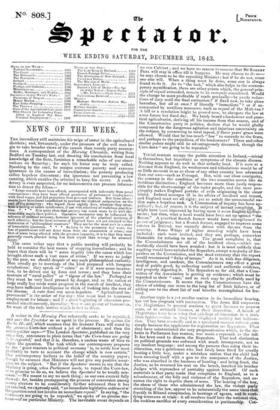A writer in the Morning Post voluntarily seeks to be
mystified, and uses the ,'pectator as an agent in the process. He quotes the Bu^k,s He, ald, which assumes that Sir ROBERT PEEL will stand by the present Corn-law without a jot of abatement ; and then the self:n-ystitler says—" The London Spectator, published on the very sati.e day, announces in plain terms that 'the Corn-laws are going '5 lie repealed,' and that it is, therefore, a useless waste of time to argue the question. The task which our' contemporary proposes to the 'great masters in political economy' is, to settle how most Profitably to turn to account the change which is now certain." Our contemporary inclines to the belief of the country paper ; though he assumes that Ministers will not give any positive assur- ance on the subject. "But if the Spectator means to say that the .Ministry is going, when Parliament meets, to repeal the Corn-law, or to promise to do so, we believe the Spectator to be totally mis- iaken."--We meant to say no such thing ; as our own context fully showed : for, besides presupposing the process of conversion among euunty electors to be considerably further advanced than it has yet reached, we expressly said, "an immediate legislative settlement of the question need-not involve an immediate repeal." In saying, "the Corn-taws are'going to be repealed," we spoke of no precise mo- ateut--of no particular Ministry. The inevitable event depends on no one Cabinet ; and we have no reason to assume that Sir ROBERT PEEL will stay in office till it happens. He may choose to do so— he may choose to be the repealing Minister ; but if he do not, some one else will. When a thing must be done, some one is always found to do it. As to " the task," which also helps in the contem- porary mystification, there are other points which, the general prin- ciple of repeal conceded, remain to be maturely considered. Would the change be most profitable if made gradually—by yearly reduc- tions of duty until the final extinction ? if fixed now, to take place hereafter, but all at once ? if literally " immediate" ? or if ac- companied by auxiliary measures, such as repeal of the Malt-tax ? A bill or a resolution might be passed now, to abrogate the law at some future but fixed day. We lately heard a landowner and prac- tical agriculturist, deriving all his income from that source, and of the Conservative party in politics, declare that he would gladly compound for the dangerous agitation and injurious uncertainty on the subject, by consenting to total repeal, if three years' grace were allowed. Would that be too much " law " to concede to the fears, and perhaps to the prejudices, of the landowners ? These and other similar points might still be advantageously discussed, though the Corn-laws" are going to be repealed."


























